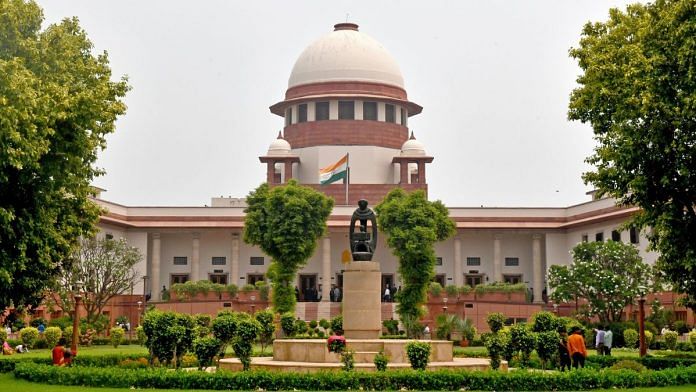New Delhi: How much power do senior advocates wield in the Supreme Court, and does the court favour petitions brought by in by them?
A new book claims that the apex court’s “preferential treatment of senior advocates is more about a bias towards familiar, respected individuals, regardless of the merits of the petitions”. It also suggests that the influence senior advocates have contributes to the heavy caseload of the Supreme Court, and vice versa.
The book, titled ‘Court on Trial’, has been authored by Associate Professor at the Bengaluru’s National Law School of India University Aparna Chandra, Professor of Law and Associate Dean at the Seattle University School of Law Sital Kalantry, and Professor of Law at the University of Chicago Law School William H.J. Hubbard. It presents a data-driven account of the Supreme Court of India, and proposes a practical agenda for reform.
In the chapter titled ‘Face Value: The Power and Influence of Senior Advocates’, the authors say that the power of senior advocates “appears greatest” at the very start of a case in the Supreme Court. This is at the initial hearing stage, when most petitions are turned away without another hearing.
The Supreme Court designates an advocate as a senior advocate if it feels they are deserving of such a distinction, “by virtue of his ability, standing at the Bar or special knowledge or experience in law”, according to Section 16 of the Advocates Act, 1961.
According to the findings of the book’s authors, the initial hearing success rate for senior advocates is 35 percent against that of other advocates at 28 percent. The book explains that while success at the initial hearing only guarantees another hearing on whether the petition should be admitted, the initial hearing is still important because “success rate at the initial hearing almost guarantees a more extensive hearing”.
“Thus, we see the ‘face value’ of senior advocates — simply by showing up to the Supreme Court, they give their clients an advantage in getting admission to further hearings,” it says.
It then delves into the question of why senior advocates see much more success in terms of being heard, compared to other advocates. The authors ask, “Is it because they bring better cases — cases that deserve to be heard by the Supreme Court — or is it that they influence the court (either because of their persuasive skill or their reputation) to take cases that it really shouldn’t be hearing?”
Do they bring better cases?
The book looks at several arguments to answer the question of why the Supreme Court (SC) favours senior advocates. For instance, it considers if the SC favours petitions brought by senior advocates because they bring better cases.
The authors collected two types of data on SC cases. First, they examined the full case records of a sample of 466 civil cases filed with the Supreme Court in 2010 as Special Leave Petitions (SLPs). An SLP allows a petitioner to appeal in the SC against any order or ruling passed by another court or tribunal.
According to the book, the authors chose this specific set to ensure they had a sample of cases that were similar in terms of type, origin and year, but which varied in terms of representation by advocates and senior advocates. They found that senior advocates have a higher success rate at initial hearings.
The authors also collected all final judgments published by the Supreme Court from 2010 to 2014. This provided them with a sample of more than 5,000 cases for which they had information on whether the petitioner was represented by a senior advocate. This data only contained information on who the lawyers in the final hearings were and which side won.
“This data can tell us whether cases with senior advocates are more likely to be winners in the Supreme Court,” the book says. It then found that the answer is “no”, and that senior advocates had a lower win rate compared to other advocates.
The win rate for petitioners with senior advocates was 57 percent against those with other advocates at 60 percent. This, it says, suggests that senior advocates, on average, represent weaker cases, and calls into question the idea that the Supreme Court favours senior advocates because they bring better cases.
“The evidence just isn’t there,” it adds.
‘A self-reinforcing cycle’
Using research by other scholars and their own data, the authors explored how much power senior advocates have and where it comes from.
“Our data indicates that, despite being among the top legal minds in India, senior advocates aren’t making the Supreme Court’s decisions better. More often than not, they’re making them worse,” the book says, while presenting a proposal “for remedying this perverse state of affairs”.
The book argues that the heavy caseload of the Supreme Court is an explanation for why senior advocates have so much influence on the court. However, it also notes that the influence of senior advocates also contributes to the heavy caseload, describing what it called a ‘self-reinforcing cycle’.
It explains, “The Supreme Court faces too many SLPs. It relies on senior advocates to decide which ones to admit. Because senior advocates hold sway with the court, litigants with weak petitions retain senior advocates to argue their SLPs, further increasing the number of SLPs. As the numbers of SLPs rise, the Court must rely on senior advocates even more. And so on and so on.”
(Edited by Smriti Sinha)



